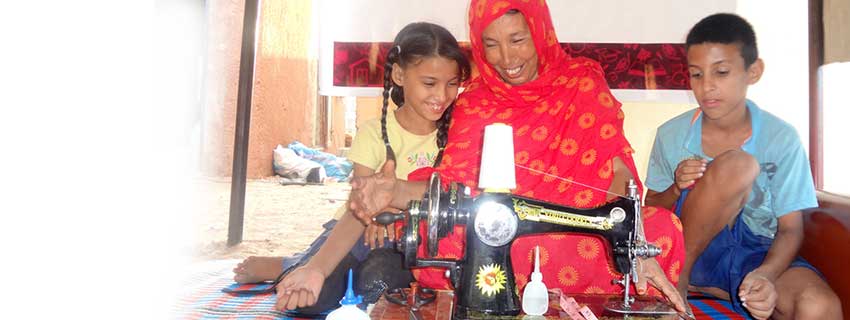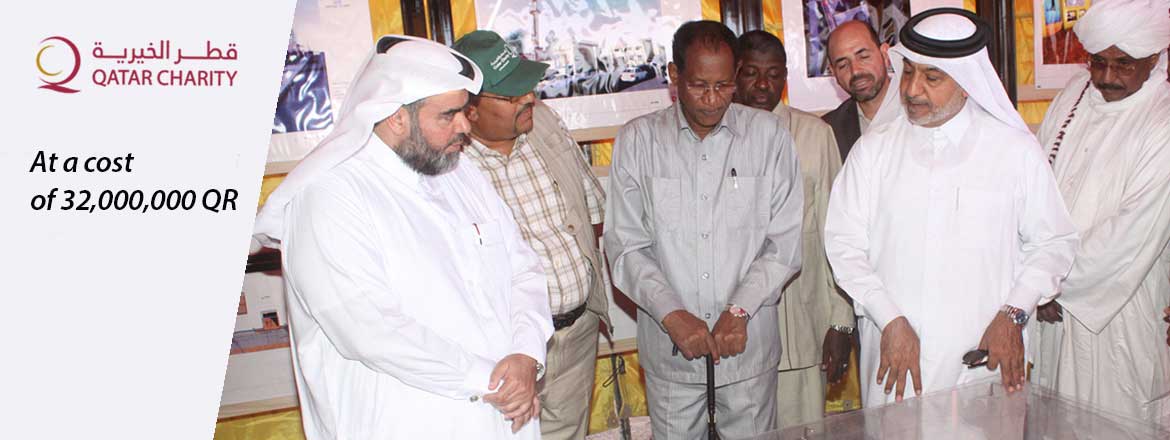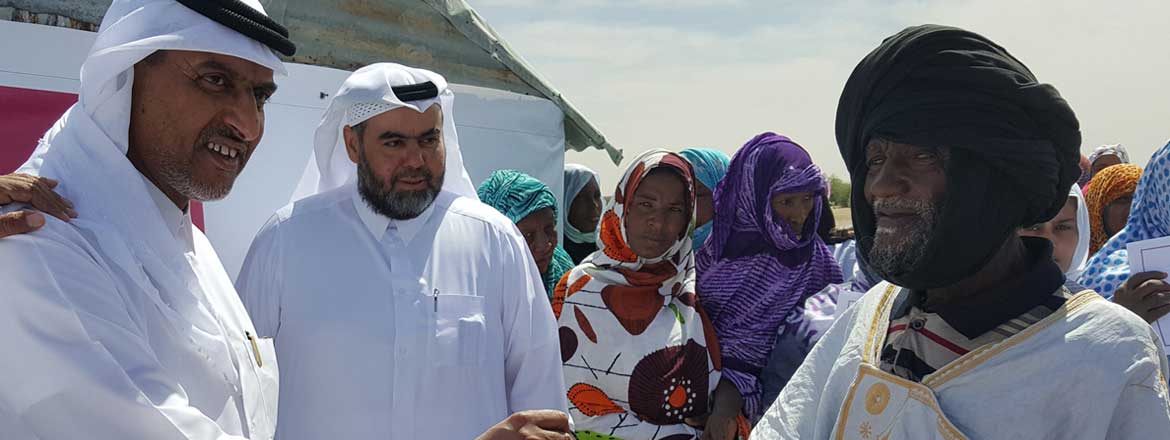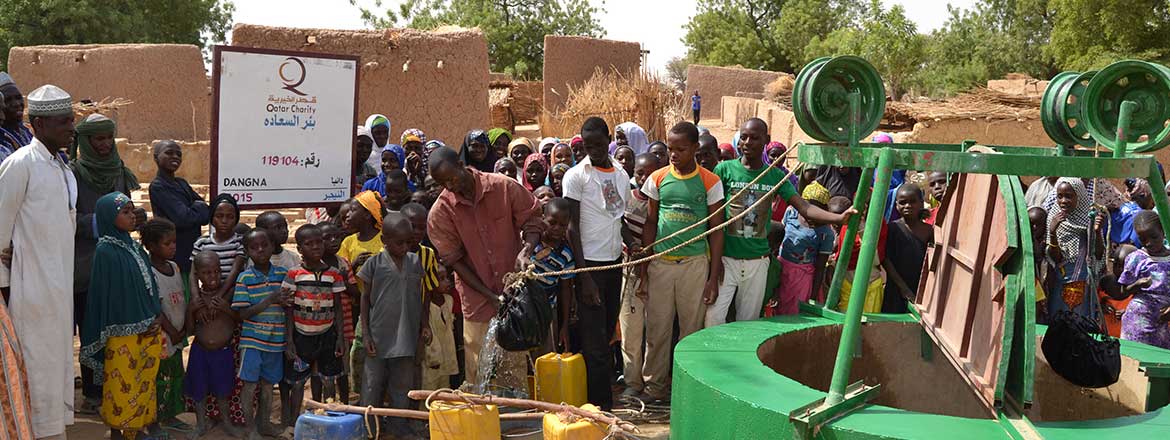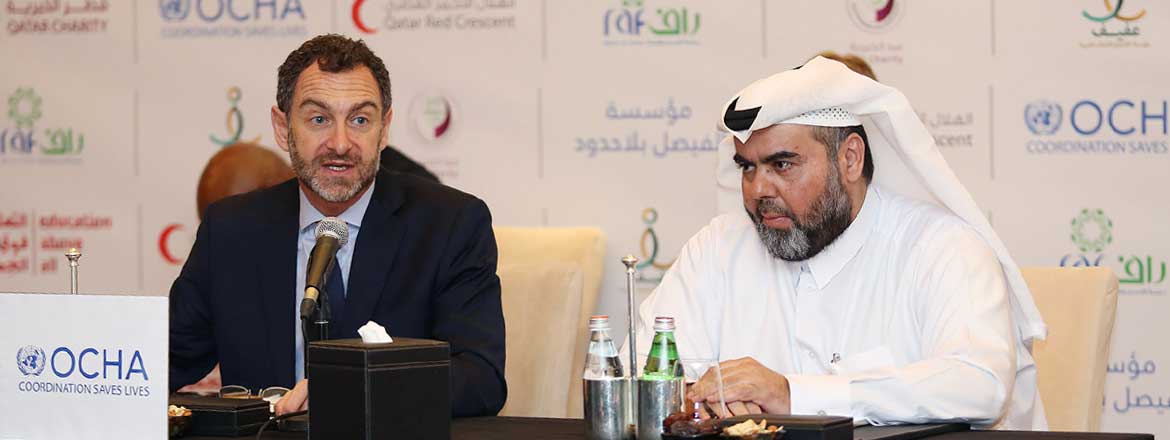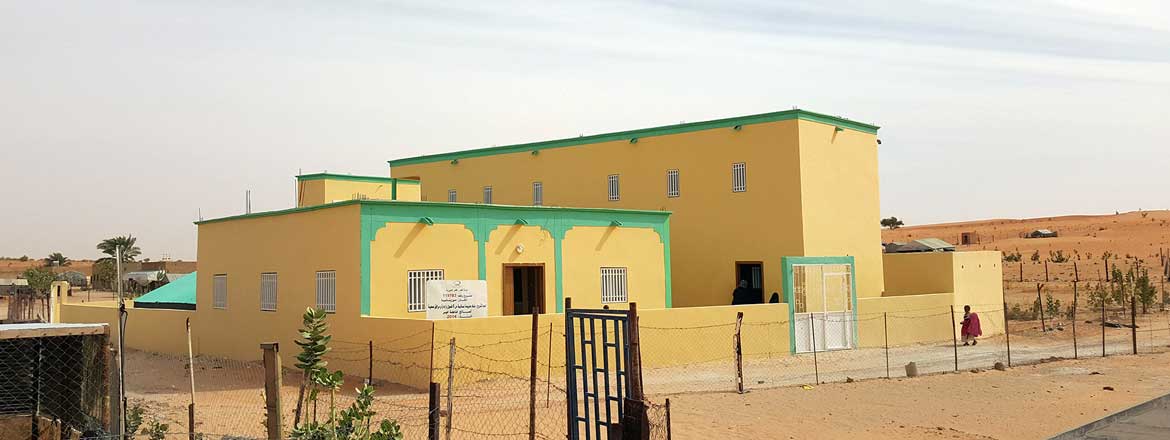Qatar Charity Establishes 40 Traditional Bakeries in Mauritania
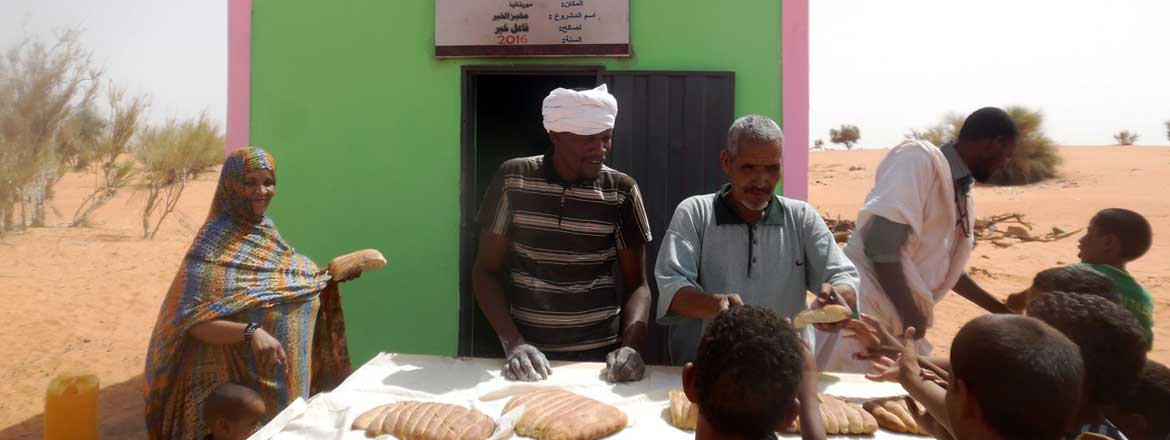
2017-02-09T12:34:25+01:00

The traditional bakeries were established in remote villages to provide a reasonable income to their owners.
QC implemented Income Generating Projects in central Mauritania region and established 10 traditional bakeries in different villages in Brakna Region, which empowered the families economically and served 8000 people from the surrounding areas. Last year, QC established 30 bakeries in several Mauritanian villages and districts benefited 24,000 people.
The traditional bakeries were established in Barkéol, Municipality of Alghabra and other villages such as Bouhrat, Wadi Alnnays, Bambira and Jabb Sundaj.
The bakeries were constructed according to certain specification to avoid damage caused to bakeries built of mud. They consist of small rooms for preparing the dough and wood-fired ovens due to power cut in the areas.
Before QC built the new bakeries, the old bakeries were very bad and rickety as they were built of mud and therefore collapsed because of rain or high temperatures in the summer season.
Breadwinners suffer
In those villages breadwinners work in agriculture during monsoon rains but because rain amount is not heavy they emigrated their villages to cities looking for job opportunities, leaving their wives bear the burden of raising their children for several months.
Positive results
The results of this project were very positive as it provided the targeted families with job opportunities while provided the families with bread at reasonable prices.
Breadwinners expressed their happiness to those income-generating projects including the bakeries which were built according to modern specifications and resistant to difficult natural conditions after they were working in old bakeries for low wages barely enough to feed their families.
They also extended their gratitude and sincere thanks to the donors of Qatar and QC for their developmental role in Mauritania, particularly in remote and rural areas which are characterized by limited services compared to urban areas.
Economic empowerment
It is noteworthy to mention that the traditional bakeries established through Income Generating Projects contributed to improve the economic conditions of the beneficiaries as they provided them with a reasonable income and provided families living in remote and rural areas with bread.
QC has already established 30 traditional bakeries distributed over several villages and rural areas which have a very limited access to basic social services.
Related News
QC Offers Income-Generating Pr
- The projects included distributing sewing machines, and holding preparatory courses in sewing and embroidery.
- Fatima bint Al Naji, “QC’s project helped me secure a fixed income to ensure for myself and my family a dignified life without having to need anyone.”
10 disabled female-breadwinners benefited from the income-generating project implemented by QC in Mauritania. It included distributing sewing machines and holding preparatory courses on sewing and embroidery.
QC aims at fighting poverty, especially that among the disabled persons and the breadwinners. This project seeks to provide a fixed income to the beneficiaries through their use of the sewing machines, which were given to them after good training.
The disabilities of the benefiting female-breadwinners varied; some of them were handicapped, and others suffered from partial paralysis.
Many Benefits
The sewing machines were delivered to the disabled women during the honoring ceremony organized by QC in cooperation with Mauritanian Association for Assisting the Handicapped, the partner responsible for the project’s implementation.
Some of the figures who attended this ceremony are: the head of the Handicapped Persons department in the Ministry of Social Affairs, the mayor assistant of Arafat Municipality in Nouakchott, the head of the Mauritanian Association for Assisting the Handicapped, and QC’s director of Social Care department in QC’s office in Mauritania.
Mr. Ahmed wild Wihda, Mayor Assistant, expressed his sincere gratitude for the parties which funded and implemented this project. He also expressed his hope for future similar projects so that more people would benefit from them.
Mr. Jamal wild Abdel Jaleel, Head of the Mauritanian Association for Assisting the Handicapped, said, “This kind of projects funded by QC is very important and essential. It has many benefits: it helps fighting poverty, supporting the disabled, and assisting the breadwinners. Such categories need our help and care.”
The Beneficiaries’ Commendations
After the ceremony was over, the officials distributed the sewing machines to the beneficiaries who expressed their deep joy and happiness. They said that the project was superb because it offered them training and sewing machines and that they now had jobs that could help them bring in a fixed income. This way, they said, they could ensure a dignified life for themselves and their families.
Ms. Fatima bin Al Naji, one of the beneficiaries, said, “I cannot express the amount of happiness I am feeling right now. I thank QC and its local partners and the beneficiaries who funded this project. I hope that this is the beginning of something good. Now that I am done with the training and I got a sewing machine, I think I will now embrace life happily.”
Ms. Adada bint Al Sofi said that she felt ready to start working on the sewing machine she received. She also thanked all the philanthropists who helped fund and implement this important project.
Conventional Bakeries
QC had recently implemented a group of income-generating projects in different cities and villages in Brakna, Mauritania. The projects included 8 conventional bakeries from which around 7,000 people benefited.
The bakeries have rooms for bread and dough. The most appropriate kind of ovens to equip these bakeries with was brick ovens because these areas, where the project was implemented, don’t have electricity and because bricks are found excessively and at great prices. Some of the beneficiaries would even get the bricks themselves. As for the construction of the bakeries, they were built according to modern technologies so that they would not suffer from the problems brick bakeries generally face.
The bakeries were built in several cities and villages in Brakna such as Magta-Lahjar, Sangrafaa, Tachott, Taiba, Al Hoda, and Dutti (which is very far, almost isolated).
These bakeries left great impact on the villagers who could now buy bread at cheap prices and at the quantities they desire. Bread, of course, is essential to most of the villagers – it is part of their food.
You can donate to support such projects through the link: Click here
QC’s Delegation Visits Rofaqa
The village consists of 200 apartments, a kindergarten, 2 primary schools, 2 secondary schools, a training center, a medical clinic, a mosque, a market, two water plants and playgrounds for the children.
The village offers comprehensive services to 200 families of the orphans, and 5,000 people from the surrounding regions. It offers shelter, health, education, qualification, sports, and entertainment services.
The village’s work progress is fast. It is expected that it will be entirely established by the middle of next year.
Mohammed Hamed Al Billa, Wali River Nile in Sudan; and His Excellency Mr. Rashid bin Abdu ar-Rahman Al Na’imi, Qatar Ambassador in Sudan; were present during the inspection visit QC’s delegation paid to the village. The delegation was headed by Mr. Youssef bin Ahmed Al Kuwari whose visit was to review the work progress of Rofaqa Village for Orphans which QC had started establishing in River Nile state few months earlier at a cost of 32,000,000 QR.
‘Rofaqa Village’ is considered to be a comprehensive developmental environment which works on developing the orphans’ personalities. It has multiple facilities that offer basic services in the fields of shelter, health, education, qualification, sports and entertainment. The village is situated in Ad-Damar in Nile River state; 200 families of the orphans and 5,000 people from the surrounding regions benefit from it.
Facilities of the Village
The village consists of 200 apartments (for widowed mothers and their orphaned children), a kindergarten, 2 primary schools (one for boys and one for girls), 2 secondary schools (one for boys and one for girls), a training center, a medical clinic, a mosque which can receive 800 performers of prayer, 2 water plants (2 wells with tanks to provide the village with drinking water), playgrounds and fields. The inhabitants of nearby regions are expected to benefit from the services the village offers, as well.
The work on the village started this March (2015) and is expected to be over in January 2016. Although the work on the village was supposed to be over in March 2017, it is expected to be over 9 months earlier because of the fast work progress, and the technology used in building (prefabricated roofs, for example) which QC uses for the first time.
The Ambassador’s Speech
During the inspection visit, Mr. Al Na’imi expressed his appreciation for the Sudanese people stressing the fact that the officials of the two countries work to develop their relationships. He also thanked QC for its distinguished developmental projects.
Mr. Al Kuwari, QC’s CEO, emphasized QC’s interest in establishing the village for the benefit of the orphans, “QC cares so much about the orphans. It aspires that this village will make a difference in their lives and that they will benefit from its services and facilities.”
In addition, a representative of Ad-Damar welcomed the guests and QC’s delegation and commended its efforts in implementing such project. “We are expecting that it will greatly contribute to the development of our region,” said he.
At the end of the ceremony, Mr. Al Billa thanked Qatar and its people for their support of humanitarian work around the world in general and in Sudan in particular. “QC has been of great help in contributing to the peace, stability, and development in Darfur. We thank it for standing by the side of its Muslim brothers and sisters in the poor communities in Asia and Africa. QC is always there to help in times of disasters and catastrophes,” Mr. Al Billa said. He also honored His Excellency the Ambassador of Qatar and QC.
‘Rofaqa Initiative’ aims at offering comprehensive care for the orphans and children around the world. It aspires to include all different fields such as social, educational, health and psychological services. Since its establishment in December 2013, 41,000 orphans have been sponsored. QC currently sponsors more than 80,000 orphans worldwide.
You can donate to support such projects through the link:Click here
QC Hands the Keys of 100 House
- Sheikh Hamad bin Nasser bin Jassim Al Thani, "This project is part of our humanitarian duty towards the Mauritanian people who are like family to us."
- "Social Housing" project comprises 235 houses whose implementation cost more than 10,000,000 QR. The work on half of the houses is completed.
- The benefiting families were chosen according to certain conditions that were set to identify the neediest beneficiaries.
In a two-day field visit to Mauritania, His Highness Sheikh Hamad bin Nasser bin Jassim Al Thani, QC's Head of the board of Directors; and Mr. Youssef bin Ahmed Al Kuwairi, QC's CEO, handed the keys of more than 100 houses to the Mauritanian families benefiting from the 'Social Housing' project.
The beneficiaries who received the keys of the houses were from Nouakchott and R'Kiz District, in Trarza Region 200 km from the capital. The delegation was accompanied by His Excellency Mr. Abdul Rahman Ali Al Kabisi, the Qatari Ambassador of Mauritania; and Mr. Idris As-Sahil, QC's Office Director in Mauritania. The residents and, most importantly, the benefiting families were in the reception of the delegation.
A Huge Project
The project is to build 235 housing units for certain chosen Mauritanian families. So far, 110 houses have been implemented (i.e. 50% of the work is completed). The benefiting families were chosen based on the level of their poverty. Each housing unit comprises 2 rooms, a toilet and a kitchen. The houses were built using reinforced concrete and had high quality doors and windows. The total cost of the project implementation was 10,079,000 QR.
A ceremony was held so as to celebrate handing the keys of the new houses to the beneficiaries. During the event, Sheikh Hamad bin Nasser bin Jassim Al Thani said, "This project is part of our humanitarian duty towards the Mauritanian people who are like family to us. The Qatari philanthropists believe that their donations are part of their duty towards their brothers and sisters. They do not want to be thanked. They just wish Mauritania more development and prosperity."
Field Visit
This project is considered the first of its kind. Delivering the keys of the houses to their new owners was one of its stages. During the field visit, his Excellency Sheikh Hamad reviewed the work progress of QC’s projects there. He also reviewed a summary of the projects that are expected to be implemented through the annual plan for 2016.
In addition, QC’s officials held a meeting while being in Nouakchott. They reviewed QC’s accomplishments in Mauritania. The total cost of projects in 2015 was 25,079,000 QR. The delegation also reviewed QC’s future plans for the country in the fields of education, health, orphans sponsorship, economic empowerment and poverty.
Plans and Projects
Since its first establishment in Mauritania, QC has implemented hundreds of projects from which so many people benefited; 2,400 orphans and poor families benefited from its sponsorship program. The total cost of the implemented projects was 25,079,000 QR. 10,000,000 QR were spent on providing 235 dignified houses for poor families; more than 1,000,000 QR were spent on 305 economic projects; more than 2,100,000 were spent on 4 centers that offer multiple services; and 2,400,000 QR were spent on the establishment of 13 mosques.
Earlier Visit
During the visit, QC's delegation met with 700 of the orphans QC sponsors there and their mothers. The families held a welcoming ceremony for the delegation. It was attended by the Qatari Ambassador of Mauritania; they expressed their gratitude for what Qatar, QC, and the Qatari philanthropists offered to these orphans in particular, and the Mauritanian people in general.
You can donate to support such projects through the link: Click here
QC Drills 70 Wells in Niger in
Water projects are a priority in Niger because 50% of its people do not have clean water
QC's offices own water-well drillers in Somalia, Niger, Burkina Faso and Sudan, which reinforces their work in the water and sanitation sectors.
In 2015, QC was able to drill 70 wells in Niger through which it provided drinking water to 35,750 families and the cattle they own at a cost of around 2,500,000 QR.
The water in Niger, where the climate is dry, is considered one of the severest problems its inhabitants suffer from. 50 % of its people do not get drinking water. Therefore, water projects are a priority for Niger and other humanitarian organizations, including QC.
Great Needs
Mr. Mohammed Taher Al Sweibqi, QC's Office Director in Niger, said that the water projects QC implemented in Niger saved the lives of so many families. "QC's water projects provided drinking water for multiple regions where the total number of beneficiaries reached 35,750 families. The cattle the families own and the surrounding areas benefited as well," added he.
Mr. Al Sweibqi thanked the philanthropists and donors from Qatar who have been very generous with the donations they make. "Your donations help revive the cities where the wells are dug, where the rate of poverty reached 60%. The Nigerians' need for drinking water is still great, which is why more donations should be made," said he.
The drilled wells vary to include artesian aquifers and shallow wells; some wells are supplied with solar energy, others with electricity. These wells were drilled in several areas such as Zinder, Maradi, Tillabéri, and Dosso; the distances between these areas and Niamey differ and the farthest of some is 1,000 Km. Plus, 6 wells were drilled in Niamey, the Capital.
Teachers' Institutes
Some wells are drilled to meet the needs of the schools, institutes, and the surrounding areas. Mr. Al Sweibqi participated in the official opening ceremony of a training institute for the teachers in Niamey. He was accompanied by Aïssata Issoufou Mahamadou, the First Lady, the Minister of Education and a number of officials after QC had drilled a well supplied with solar energy at the same institute.
During the opening, Niger's Minister of Education said, "The artesian aquifer project QC implemented in the institute for training teachers came as a real solution to the water problem the institute and the people surrounding it used to suffer from. I sincerely thank QC for its efforts. It helped so many people overcome such a severe problem."
Private Drillers
QC's implementation of water projects was reinforced in the beginning of 2015 when the office bought a German driller to dig artesian aquifers. The driller was of high quality and specifications. It cost 1,500,000 QR. A training course was organized for the workers and the people responsible for the driller in order to reinforce QC's efforts in Niger. The driller contributed to the increase in the number of drilled wells QC is planning to dig in the following years, and it will also contribute to the reduction of costs.
It is worth noting that in 2014, QC drilled more than 45 different types of wells; some had manual pumps, some depended on electricity and others on solar energy. The total cost of the implementation of these wells was around 2,100,000 QR. The number of beneficiaries exceeded 35,600 people. In addition, the total number of drilled wells until the end of 2014 reached 264 at a total cost of more than 9,000,000 QR from which around 318,170 people benefited.
QC's offices own water-well drillers in Somalia, Niger, Burkina Faso and Sudan which reinforces their work in the water and sanitation sectors. Many wells were drilled using these drillers to secure drinking water for the beneficiaries.
You can donate to support such projects through the link: Click here
Qatari Humanitarian Organizati
Al Kuwairi,
"Coordination and cooperation between active humanitarian actors is necessary to offer better services, and humanitarian and development programs to the countries of the Sahel."
Mr. Toby Lanzer,
"We cannot stop the reasons behind the people's needs in Sahel unless we work using a methodology based on security, development and humanitarian work."
As part of the coordination between Qatari Humanitarian Organizations and OCHA, a round table meeting was held in Doha about humanitarian work in the African countries of the Sahel. Its main objectives were to review the work of the humanitarian actors, to discuss the possible cooperation, and to build partnerships in the countries of the Sahel considering the exacerbating conditions of such countries.
Mr. Toby Lanzer, the United Nations Assistant Secretary-General and Regional Humanitarian Coordinator for the Sahel, and the representatives of Qatari humanitarian societies and institutions attended the meeting. The Qatari organizations included: Qatar Red Crescent, Qatar Charity, Sheikh Eid Charity, Sheikh Thani bin Abdallah for Humanitarian Services (RAF), Al Faisal Foundation, Afif Foundation, Education Above All and Silatech. All the Qatari humanitarian organizations active in the Sahel displayed their achievements there through presentations.
At the beginning of the meeting, Mr. Youssef bin Ahmed Al Kuwairi, QC's CEO, thanked all the people who attended the meeting which discussed a very important region in Africa. The Sahel includes a group of countries where Qatari charity organizations are active.
"QC pays extra attention to this region when it implements its humanitarian projects and programs. It is clear through the fact that we have 5 headquarters in Chad, Niger, Mali, Burkina Faso and Mauritania. Through its international and local partners, QC works in the 11 countries of the Sahel," said he.
As he also mentioned, in the last 3 years QC implemented more than 6,000 projects at a cost of around 148,000,000 QR covering most of the sectors. QC is still implementing more projects in the fields of education, health, water, sanitation, food security, livelihoods, economic empowerment and others.
Mr. Al Kuwairi stressed on the importance of cooperating and coordinating with active humanitarian organizations. "Because Qatar Charity believes in its mission and the humanitarian principles of assisting others, it is willing to coordinate and cooperate with all international, regional and local organizations so as to offer humanitarian and developmental programs and services to the countries of the Sahel."
Continuous Crises
Mr. Lanzer said that the exacerbating needs for humanitarian aid are a result of a three dimensional crisis: instability, lack of security, and climate change. "We cannot stop the reasons behind the people's needs in Sahel unless we work using a methodology based on security, development and humanitarian work. The humanitarian actors must always follow up with the deep needs of the countries of the Sahel," said he.
He highlighted the importance of cooperation between the active organizations participating in the development programs to achieve stability. Without such programs, the the need for humanitarian aids will be indefinite.
Mr. Lanzer expressed his gratitude for the Qatari humanitarian organizations and commended their work and efforts. "We thank these organizations for expressing their willingness to cooperate and coordinate. We hope that this meeting will be very successful and that the results will be as great as expected. We also hope it would bring good for the people living in the Sahel."
The work agenda of the round table included exchanging information about the work of Qatari humanitarian organizations in the Sahel, the projects in progress, and the fields they cover. It also covered the chances of cooperation and exchange of partnerships with OCHA, which is covering the humanitarian work in the Sahel. In addition, the meeting was to reinforce coordination mechanisms and exchange of information with the UN.
The African Countries of the Sahel
It is worth mentioning that the Sahel African countries comprise of 9 countries: Chad, Niger, Nigeria, Cameron, Burkina Faso, Mali, Mauritania, Senegal and Gambia. Based on the studies conducted by OCHA, the Sahel is one of the most important places for the main humanitarian operation centers for the year 2016. It is expected that 23,500,000 people might suffer from the lack of security of food, healthcare, severe malnutrition, dire shortage in drinking water, malfunction in sanitation and problems in education. The armed disputes and violence made 4,500,000 people displaced.
Since QC always makes sure to offer the best humanitarian aids, it cooperates with international organizations; especially the United Nations. OCHA and QC have a distinguished relationship especially at the level of coordination.
QC Opens a School for Women in
In Mauritania, QC established and equipped a school for women from which hundreds of female students benefited.
The school was established in Trarza Region, in bi’r al Kheir Village near Boutilimit to the south of Mauritania. The school has 6 classrooms, administrative buildings where there are 5 equipped offices, and health facilities. The school’s staff consists of a principal, an assistant, 8 regular teachers, and 2 assisting teachers. 100 female students from different levels study there.
Caring for Education
Mr. Idris As-Sahil, QC’s Office Director in Mauritania, said, “QC implemented this project because it prioritizes the educational sector in all distant regions where educational institutions are not found. Schools for women need so much support, especially that this school teaches the Holy Quran, Quranic and Sharia sciences and linguistics”.
He also said that those in charge of the school aspired to adding other subjects such as mathematics, computer science and languages. “This way, students will be able to study religious and secular sciences which help learners find good jobs. The total cost of establishing the school reached 400,000 QR. We are proud to see hundreds of girls benefiting from the project,” said he.
Need for Support
Ms. Om Kolthom bint Abah, School’s Principal, said that the school had 100 regular students, some of which had memorized the Holy Quran. “The school teaches the sciences of Tajwid, Principles of Islamic Jurisprudence, Fiqh, Language and others. The school’s board seeks to organize training courses in Computer Science, hire mathematics and English language teachers so as to offer comprehensive education,” she commented. The village’s schools do not offer formal education except for a primary school that has two classrooms only.
“Here at school, we organize cultural contests and lectures from which most of the villagers benefit. However, the school still needs more improvement, especially the teacher’s salaries, equipment and books. We appreciate QC and the Qatari philanthropists for the valuable aids they offer to the needy people around the world. We thank them for helping us,” she concluded.
Commendations
The school’s students and teachers commended the performance of the school and thanked QC and the Qatari philanthropists for their efforts to spread science and help the needy around the world.
Somaya bint Mohammed, a student who memorized around half of the Quran, said, “I am very happy at school. I learned a lot about the sciences of Tajwid and Quran. The school offers us comfortable classes and facilities that helped us attend school regularly. The teachers follow distinguished methodologies that help students understand and memorize.
In addition, Fatima bin Mohammed Mawlood, Teacher of Quran Memorization and Tajwid at school, said that they teach several levels and classes. “Some girls memorize one, two or more pages every day; some memorize less because of their age. They learn Quranic sciences, too.
On a two-day visit, a delegation from QC handed the keys of more than 100 houses to the Mauritanian families benefiting from ‘Social Housing’ Project. The delegation included His Excellency Sheikh Hamad bin Nasser bin Jassim Al thani and Mr. Yousef bin Ahmed al Kuwairi, QC’s CEO.
The keys were handed to the beneficiaries in Nouakchott and Rakiz, 200 km from the Capital. The delegation was accompanied by the Ambassador of Qatar in Mauritania Mr. Abdul Rahman bin Ali Al Kibisi and Mr. Idris As-Sahil, QC’s Office Director in Mauritania. A lot of figures and benefiting families received the delegation when they arrived.
In 2015, QC spent 25,000,000 QR on the projects it implemented in Mauritania. More than 153,000 people from different regions benefited from the projects, groups with low income in particular.
The projects covered different fields such as health, education, income-generating projects, sanitation, relief, water, sponsorship (of orphans, disabled persons, preachers and imams) and others.
You can donate to support such projects through the link: Click here
